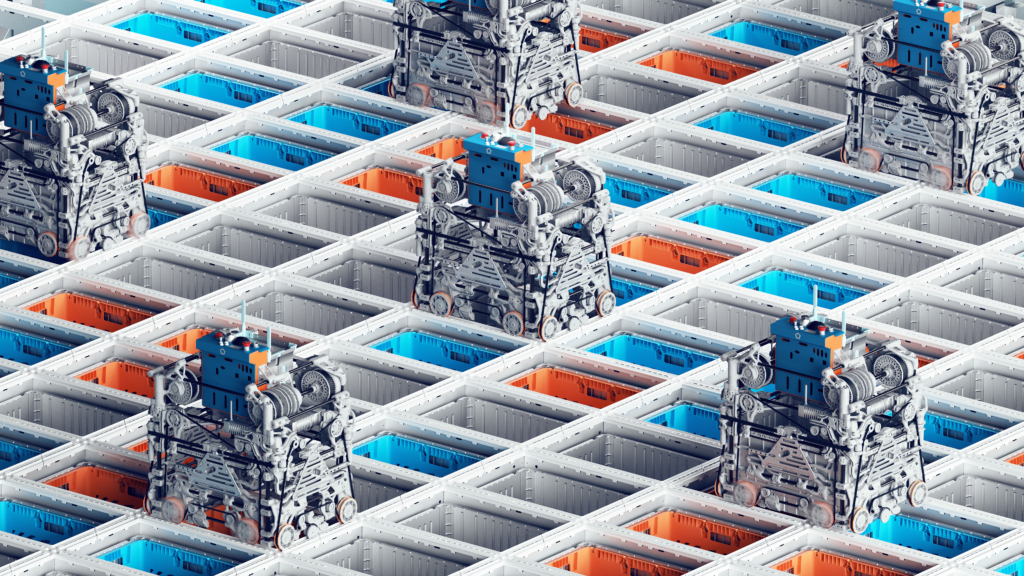ASRS to OSRS Automation
21st May 2024

Ocado are a familiar name in grocery ecommerce in the UK, but now aim to challenge major warehouse systems integrators internationally. CEO Mark Richardson spoke to David Priestman.
Ten communications per second between a warehouse robot and its operating software is impressive. Not only does that prevent collisions between the picking bots, it means that ‘appointments’ for each robot can be made for a specific tenth of a second. The routing software, ‘Dash’, communicates with every robot ten times per second in scheduled time slots. This is no ordinary automation system. Such expertise has been honed by 20 years’ operating Ocado’s 50,000 grocery line SKU storage and retrieval system in Britain.
“It’s a leading-edge ASRS, high-dense cube that can be scaled up as large as is necessary. The robots are designed to lift up to 35kg. Each storage bin can contain just over 30kg of product,” Richardson explains. Brands with complex, high-throughput operations in healthcare, retail apparel/footwear, consumer packaged goods, plus their third-party logistics operators can now access this automated fulfillment technology from Ocado Intelligent Automation (OIA). “It’s a global offer, pretty broad applications, especially in pharma,” Richardson adds.
OIA, a division of Ocado Group, formerly part-owned by the John Lewis Partnership, debuted its Ocado Storage and Retrieval System (OSRS) for the first time in North America at Manifest in February. OSRS simplifies and streamlines complex challenges facing modern supply chains using software, hardware, and processes proven in the demanding grocery industry.
“A non-grocery cube, on average, is not as big but it can be even larger, if required, for example in a general merchandise warehouse,” Richardson reveals. “We’re going for the larger systems. Non-grocery presents a breadth, rather than a throughput challenge. As the technology matures we can automate anything.” Food-retail demands fast, continuous picking, but non-food may have more and slower-moving items.
“We’re using our technology to create new products at our R&D centre in Welwyn Garden City,” Richardson says. Mention of the town of my birth and childhood, in Hertfordshire, peaks my interest further. “Automation tends to deliver better results, it’s more deterministic and very reliable. We can load our bins without humans. Inbound goods are delivered to the decant stations by pallet truck, for now,” he adds. “OSRS can buffer the outcome of the pick. Completed picks can be stored back in the grid for despatch later, therefore decoupling the processes of picking and dispatch. Prior to despatch, robots retrieve all the orders for a delivery route and bring them out of the grid. This allows the finished pick to live in the grid.”

OIA also incorporates technologies brought into the group with the acquisition of 6 River Systems and Kindred AI. These bring depth and flexibility to OIA’s products, offering a range of solutions. ‘Chuck’ is a robot order picker that does not necessitate a major investment. Kindred’s powered robot is deployed as a picking arm on top of the OSRS grid. It can be tele-operated remotely, so no engineer is required on site and Ocado Group has more than 1000 maintenance and support personnel around the world plus a 2500 strong development team in eight countries.
I asked Richardson the million-dollar question. How does OSRS compare with AutoStore, the Norwegian-invented system that has become the go-to for ASRS in the DC, sold by many system integrators? “We’re the most dense system, saving footprint,” he claims, “and OSRS is faster – more products can get through it. OSRS can be built taller than an AutoStore so can achieve a greater density in a given floor space. Because OSRS robots occupy just a single grid space, they create less congestion, so for busy grids total system throughput is higher. This all reflects our background in grocery, where volumes are typically very high compared to other industries.” The gauntlet has been laid down. What of further acquisitions? “We’re not specifically looking for new technology right now,” says Richardson, “but absolutely will do so in the future.”
read more
Ocado Claims Breakthrough Advances in Robotic Arm Capability

